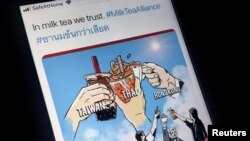A Twitter war with Chinese nationalists has forged a new online alliance among social media users in Hong Kong, Taiwan and Thailand, highlighting public solidarity among some pro-democracy movements in Asia.
The new “Milk Tea Alliance” got its name from the similarities among Taiwanese bubble tea, Hong Kong milk tea and Thai iced tea.
It all began on Twitter when popular Thailand actor Vachirawat “Bright” Cheeva-aree shared a set of pictures, with some referring to Hong Kong as a country — considered blasphemous by China’s communist government. The tweet triggered a strong response from Chinese nationalists.
Twitter is banned in China and users in the country must turn to virtual private networks (VPNs ) to access the platform. Some nationalists are part of a cyber entity referred to as “Wumao Dang” because they are paid to make comments. Wumao means 50 cents, because one comment is worth RMB 50 cents (or about a tenth of a U.S. dollar).
To quell the online uproar, Bright, whose TV drama has been popular in China, quickly issued an apology, saying that he did not read the content clearly when he shared the post. “Next time there will be no mistake like this again,” he wrote.
But the Chinese nationalists did not accept it. They discovered a post by Bright’s girlfriend Nnevvy, which talked about the possibility of the COVID-19 virus originating from a Wuhan lab.
A meme war dubbed #Nnevvy began. Chinese nationalist “netizens” criticized the online Thais, claiming that their alleged “ignorance” of Chinese history led them to their views on Hong Kong and Taiwan independence. The Chinese also mocked Thailand as impoverished.
Online commenters from Thailand quickly fought back. They cited the 1989 Tiananmen Square massacre to challenge Beijing’s authoritarianism. One post said “my country is poor but your country is pooh.” It was referring to Winnie the Pooh, a character reference that has become a lighthearted way for people across the world to mock China’s President Xi Jinping. The image remains banned in China.
Netizens in Hong Kong and Taiwan soon joined the meme war, and the Milk Tea Alliance was born.
A spokesman for the Chinese Embassy in Thailand issued a statement, calling Beijing’s “One China Principle” toward Hong Kong and Taiwan “irrefutable” and saying “the recent online noises only reflect bias and ignorance.”
Nathan Law, a former Hong Kong Legislative Council member, tweeted: “So funny watching the pro-CCP online army trying to attack Bright.” He added that the nationalists were attacking the wrong target, since “Bright’s fans are young and progressive.”
Jason Y. Ng, a lawyer and a freelance writer based in Hong Kong, is a member of the Milk Tea Alliance. His Twitter posts are often the targets of Chinese nationalists because of his pro-democracy stance.
"Thai netizens adopt a unique self-mocking style to counter attacks on my Twitter posts. Now these Chinese nationalists have given up commenting on my posts.” He told VOA, “The Alliance acts like some kind of pesticide or disinfectant—it’s fascinating!”
The Alliance also criticizes the Chinese government’s aggressive action in the South China Sea.
Thitinan Pongsudhirak, an international relations professor with Chulalongkorn University in Bangkok, told VOA that the pan-Asia network reflects the difference between official opinion and public opinion in these countries when it comes to China.
“There is divergent posture between Southeast Asian governments and their people,” he said. “Their governments actually are pro-China, such as the Philippines and Thailand.”
A Thai government spokeswoman said the government respected Thais’ freedom of expression and the issue did not affect the nation’s ties with China.
Danny Marks, an assistant professor with the City University of Hong Kong, told VOA that the online discussion has evolved into a wider political protest, because the people from these countries are increasingly dissatisfied with China's unilateral actions in the area.
“It also shows the limited ability of Chinese to wage internet warfare,” he said. “They had previously been pampered by the one-sided Chinese internet.”
Andrew Selepak, a media expert with University of Florida, said that by binding together, these voices could become a significant counter to China’s strong cyber army.
“It’s interesting to see that countries that don't have the same political clout around the world and economic clout around the world individually, you are trying to act as a collective, as a counterbalance, to the influence of China on social media,” he told VOA.
“China has been stepping up its influence in Asia. The threat is now on our doorstep. Therefore, I hope all Asian societies can build pan-Asian solidarity to fend off all forms of authoritarianism from China,” wrote Hong Kong pro-democracy leader Joshua Wong.




